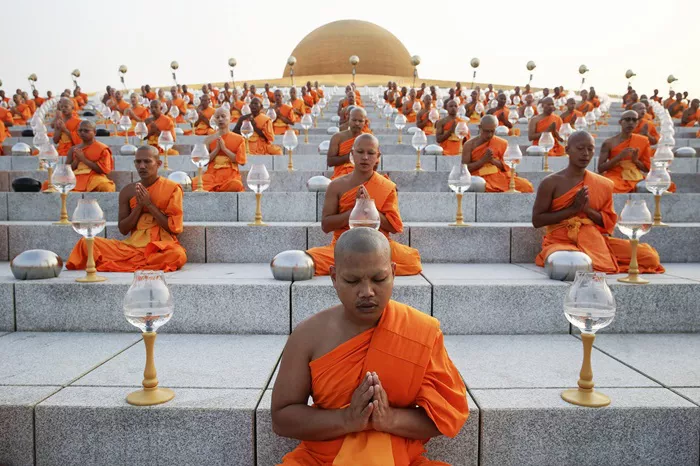Orange-robed bodhi trees, occasionally with ornaments inlaid at their bases and incense burning at their roots, are so ubiquitous in Thailand that they could easily be mistaken for art installations. In fact, the decorations symbolize that the trees have been blessed by Buddhist monks and should not be cut down.
“[The monks] do this to make people understand their connection to nature and their responsibility to nature,” said Sue Darlington, professor emeritus of anthropology and Asian studies and author of “The Ordination of the Trees.”
As of 2014, Thailand was losing an average of 140,000 hectares (346,000 acres) of forest cover each year to deforestation and forest fires. The destruction of trees leads to biodiversity loss, increases greenhouse gas emissions, causes flooding, and threatens wildlife.
These ordination ceremonies—some of which may have taken place as far back as the 1980s—represent one of the ways a small number of Buddhist monks are involved in conservation efforts. Others include fighting forest fires, preventing poaching, and educating farmers on more sustainable agricultural practices.
While the exact number of trees protected through the ordination ceremony is unclear, Vijo Varghese, co-founder of the Thai conservation project Our Land, said the impact of individuals cutting down trees for wood is likely to be greater than if large-scale development were to occur.
“It’s making Thais rethink,” he said.
More than 90 percent of Thailand’s population is Buddhist. Trees are considered sacred in Thailand, said Oraya Sutabutr, co-founder of the Bangkok-based environmental advocacy group Big Tree Project. She explained that protecting nature is seen by some as “making good deeds” – an important part of Buddhist practice, where actions today have the potential to impact the afterlife.
Yet Darlington said community development and conservation don’t necessarily fit the conservative stereotype of monks who stay away from society.
For Varghese, however, having a spiritual leader that people can connect with is “a very critical and important part of solving the environmental crisis.” Religious leaders often play an important role in communities, especially in older communities, he added.
Given that many people use spiritual beliefs as a guide to solving big problems, Varghese thinks environmental NGOs should consider tapping into that. Environmental issues have long been viewed through a scientific lens, rather than a spiritual lens, he says.
“As a conservationist… I’m not saying we should all become hippies, just that it should be about spirituality, God, and planting trees, but if spirituality can be a tool to help, then it should definitely be considered,” he says.
Suthabut has found that working with monks who double as community leaders is more effective than working with local authorities or village chiefs. “The monks are higher up than these people,” she says. If NGOs don’t already have such collaborations, she adds, partnering with foundations that already work with monks would be a good start.
But eco-monks, while influential, are few in number, Chaya Vaddhanaphuti, a geography lecturer at Chiang Mai University, said in an email. The question, she adds, is how to “train more monks, religious leaders, or counselors who have the courage to talk to the laity about these heavy topics.”
Yet conservation work, especially for monks, is not without risk.
“Many monks who do this kind of work…have to be extremely careful because they face a lot of opposition, especially from politicians, businesses or individuals who benefit from faster, mainstream economic development and feel threatened by the community work these monks do,” Darlington said.
In 2005, eco-monk Phrakhu Supoj Suvacano — Phrakhu means monk who is a teacher — was stabbed to death. He was believed to have been targeted because of his work to protect the land around a meditation center in Chiang Mai. Others have died at the hands of poachers, Sutabutr said.
Phra Paisal Visalo, as the monk is called, is responsible for protecting the forests of Chaiyaphum province from forest fires and poaching, and his area is relatively small, which is why he doesn’t think he has faced such threats yet. But as the natural environment becomes increasingly damaged, he sees “more of a need to help protect nature,” he wrote in an email.
Thailand experiences a roughly 14-week forest fire season starting in February each year. Between July 2021 and July 2022, about 930 forest fire alerts were reported.
Visalo works with villagers to create fire breaks — gaps between vegetation to slow the spread of fire — and conducts patrols during the dry season with firefighting equipment. “Regular patrols also help reduce poaching,” Visalo wrote.
He is also the chairman of the Plant Trees Plant Dharma Foundation, a secular organization dedicated to promoting afforestation and expanding green space.
“I started protecting forests because I live in forests, depend on forests, and see the value of forests and nature. … In addition to caring for forests, I also persuade people to help protect nature,” Visalo said.
According to Darlington, monks began working with farmers as early as the mid-20th century. As the government pushed for rapid economic development, farms were taken over by large companies and farmers were deeply in debt. Some monks began to think about practical ways to alleviate the suffering of farmers.
“Many of them are working with farmers to move them to sustainable farming practices and get them off cash cropping that leads to debt and environmental problems,” Darlington said.
Today, in the northern province of Nan, there’s an eco-monk — who works on conservation projects — who experiments with various sustainable farming practices on the farm behind his temple, then shares his findings with local farmers, Darlington said.
In Chonburi, dozens of students sign up every year at the Mabu-Uang Sufficiency Economy Meditation Center to learn from eco-monk Paku Sangkhong Thanapanyo Kunsuri, who has expertly blended Buddhist concepts with alternative farming practices.
“We need to understand that monks have a high status in Thai society,” Vadanaputi said. “So the eco-monk movement can make a big difference by standing with the people.”

